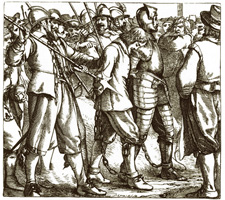Then proclamation was made, that they that had aught to say for their lord the king against the prisoner at the bar, should forthwith appear and give in their evidence. So there came in three witnesses, to wit, Envy, Superstition, and Pickthank. They were then asked if they knew the prisoner at the bar; and what they had to say for their lord the king against him.
Then stood forth Envy, and said to this effect: My Lord, I have known this man a long time, and will attest upon my oath before this honorable bench, that he is—
Hold! Give him his oath. (So they sware him.) Then he said—
Envy: My Lord, this man, notwithstanding his plausible name, is one of the vilest men in our country. He neither regards prince nor people, law nor custom; but does all that he can to possess all men with certain of his disloyal notions, which he in the general calls principles of faith and holiness. And, in particular, I heard him once myself affirm that Christianity and the customs of our town of Vanity were diametrically opposite, and could not be reconciled. By which saying, my Lord, he does at once not only condemn all our laudable doings, but us in the doing of them.
Judge: Then did the Judge say to him, Do you have any more to say?
Envy: My Lord, I could say much more, only I would not be tedious to the court. Yet, if need be, when the other gentlemen have given in their evidence, rather than anything shall be wanting that will dispatch him, I will enlarge my testimony against him. So he was bid to stand by.
Then they called Superstition, and bid him look upon the prisoner. They also asked, what he could say for their lord the king against him. Then they sware him; so he began.
Superstition: My Lord, I have no great acquaintance with this man, nor do I desire to have further knowledge of him; however, this I know, that he is a very pestilent fellow, from some discourse that, the other day, I had with him in this town; for then, talking with him, I heard him say, that our religion was naught, and such by which a man could by no means please God. Which sayings of his, my Lord, your Lordship very well knows, what necessarily thence will follow, to wit, that we do still worship in vain, are yet in our sins, and finally shall be damned; and this is that which I have to say.
Then was Pickthank sworn, and bid say what he knew, in behalf of their lord the king, against the prisoner at the bar.
Pickthank: My Lord, and you gentlemen all, This fellow I have known of a long time, and have heard him speak things that ought not to be spoke; for he has railed on our noble prince Beelzebub, and has spoken contemptibly of his honorable friends, whose names are the Lord Old Man, the Lord Carnal Delight, the Lord Luxurious, the Lord Desire of Vain Glory, my old Lord Lechery, Sir Having Greedy, with all the rest of our nobility; and he has said, moreover, That if all men were of his mind, if possible, there is not one of these noblemen should have any longer a being in this town. Besides, he has not been afraid to rail on you, my Lord, who are now appointed to be his judge, calling you an ungodly villain, with many other such like vilifying terms, with which he has bespattered most of the gentry of our town.

As the trial in Vanity Fair continues, the court sends out a summons for witnesses. The people of the town are encouraged to come and testify against the two pilgrims. Three witnesses answer the call. These witnesses represent three distinct motives behind the persecution of the church. Why does persecution and oppression arise? Bunyan identifies three causes: Envy, Superstition and Pickthank.
The first motive is Envy. The pilgrims were gaining a hearing in the town. Though few were convinced by their message, a growing number were curious. Those who hold influence in the town were alarmed by the attention and sympathy given to the pilgrims. They wanted Christian and Faithful silenced. Their envy gave rise to persecution.
Envy springs from covetousness in the heart. It is a discontent at seeing the success or prosperity of another. It is a longing to attain the rewards or status of another. It was envy that played a role in Jesus’ suffering:
Therefore, when they had gathered together, Pilate said to them, “Whom do you want me to release to you? Barabbas, or Jesus who is called Christ?” For he knew that they had handed Him over because of envy (Matthew 27:17–18).
It was envy that stirred the Jews to persecute Paul and Barnabas at Antioch in Pisidia.
On the next Sabbath almost the whole city came together to hear the word of God. But when the Jews saw the multitudes, they were filled with envy; and contradicting and blaspheming, they opposed the things spoken by Paul (Acts 13:44–45).
Paul told the church at Philippi that envy was even a motive for some who were preaching Christ, thinking that by doing so they would cause trouble for Paul and thwart his efforts to spread the gospel.
Some indeed preach Christ even from envy and strife, and some also from goodwill: The former preach Christ from selfish ambition, not sincerely, supposing to add affliction to my chains; but the latter out of love, knowing that I am appointed for the defense of the gospel. What then? Only that in every way, whether in pretense or in truth, Christ is preached; and in this I rejoice, yes, and will rejoice (Philippians 1:15–18).
The second motive is Superstition. This is not “superstition” in the sense that we often define it: an unfounded belief in or fear of the supernatural. Rather, it is the older definition that Bunyan has in mind: “excessive exactness or rigor in religious opinion or practice” rooted in “false religion; false worship” (Noah Webster, American Dictionary of the English Language, 1828).
When Christian and Faithful came to Vanity Fair preaching the true gospel of grace, they exposed the false religions embraced by the town. True salvation is by grace alone, through faith alone, in Christ alone. All religions are false that attempt to substitute something or someone for Christ or insist that something more must be added to Christ. Superstition felt threatened when he heard the clear message of the pilgrims that by his own efforts, works and ingenuity he could “by no means please God.” He was offended that Christian and Faithful would think his “religion was naught.” And so he added his voice condemning them.
The final motive that underlies the persecution of the church is Pickthank. Pickthank is an archaic term that denotes “a whispering parasite” or “an officious fellow who does what he is not desired to do, for the sake of gaining favor” (Noah Webster, American Dictionary of the English Language, 1828). A pickthank is one who bows to social pressure to be in with the crowd. He is the protestor who doesn’t really know what he is protesting. He is the angry voice in the mob who is only upset because everyone else is. He is not driven by personal offense or conviction to join others in their abusive behavior; he may even inwardly recoil at it. But he joins in anyway so not to be left out or singled out himself. The town had turned against the two pilgrims and had brought them to stand trial. Consequently, Pickthank is now willing to “pick” on Christian and Faithful in order to gain the “thanks” (acceptance and approval) of his fellow townspeople.
In his testimony Pickthank speaks of the friends of the prince who are the nobility of the town of Vanity. These noblemen represent our fallen human nature:
Lord Old Man
… put off, concerning your former conduct, the old man which grows corrupt according to the deceitful lusts (Ephesians 4:22).
Lord Carnal Delight
… the carnal mind is enmity against God; for it is not subject to the law of God, nor indeed can be. So then, those who are in the flesh cannot please God (Romans 8:7–8).
For you are still carnal. For where there are envy, strife, and divisions among you, are you not carnal and behaving like mere men? (1 Corinthians 3:3)
Lord Luxurious (excessive indulgence)
For all the nations have drunk of the wine of the wrath of her fornication, the kings of the earth have committed fornication with her, and the merchants of the earth have become rich through the abundance of her luxury (Revelation 18:3).
Lord Desire of Vain Glory
Let us not be desirous of vain glory, provoking one another, envying one another (Galatians 5:26, KJV).
Lord Lechery (lewdness / lust)
Let us walk properly, as in the day, not in revelry and drunkenness, not in lewdness and lust, not in strife and envy (Romans 13:13).
Sir Having Greedy (covetousness)
For this you know, that no fornicator, unclean person, nor covetous man, who is an idolater, has any inheritance in the kingdom of Christ and God (Ephesians 5:5).
These noblemen have corrupted the town and its fair. Apart from God all is Vanity. The town in its sinfulness has turned against the true King and against Christian and Faithful. In the next post we will hear Faithful’s reply to the charges brought by Envy, Superstition and Pickthank.
A Guide to John Bunyan’s The Pilgrim’s Progress
See TOC for more posts from this commentary
The text for The Pilgrim’s Progress and images used are public domain
Notes and Commentary ©2017 Ken Puls
Unless otherwise indicated, all Scripture quotations are from the New King James Version (NKJV) ©1982 by Thomas Nelson, Inc.









